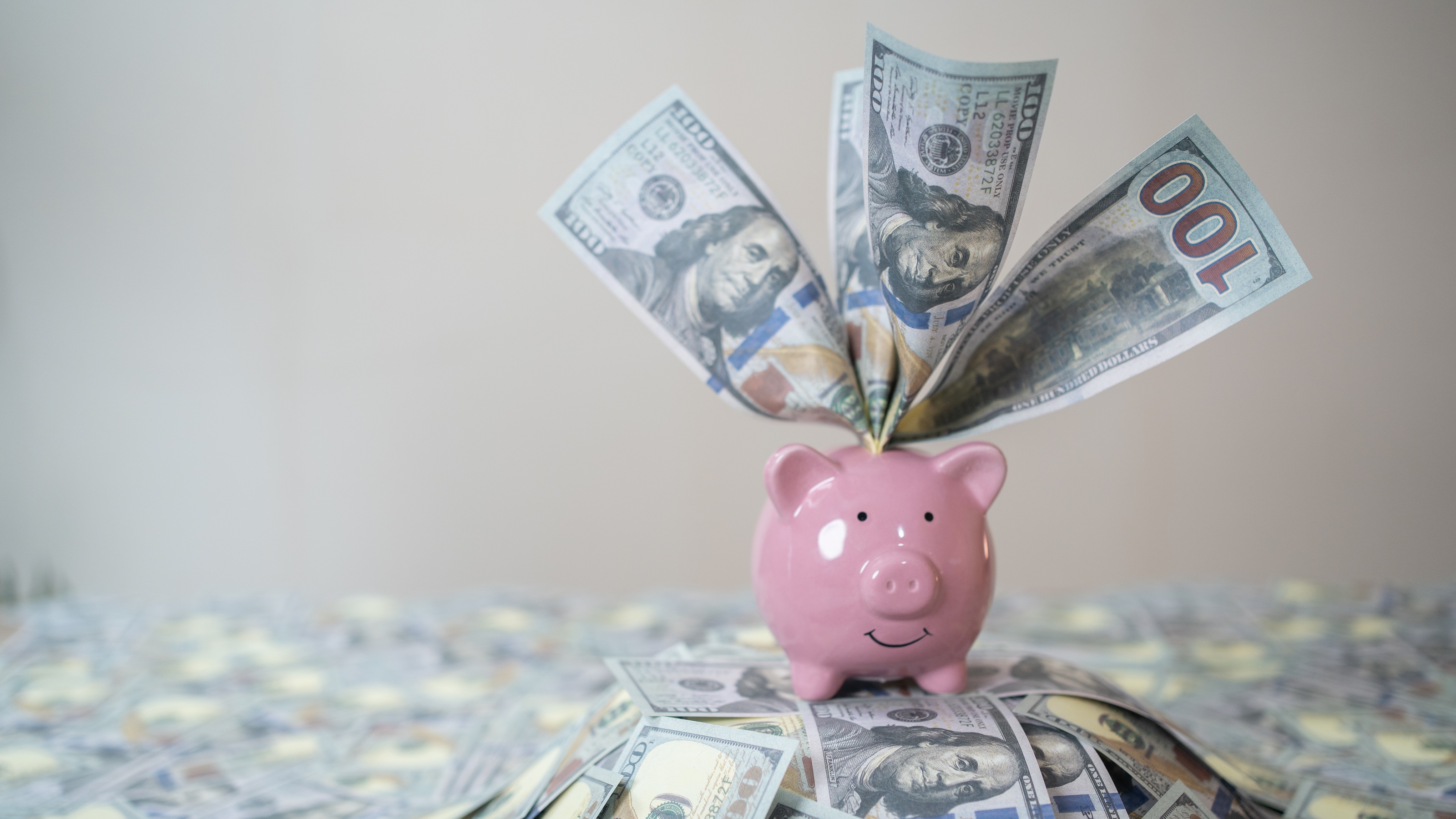What Would Happen if You Put Your Tax Refund in an IRA?
Not only could you get a tax break, but the compounding effect over 35 years could turn the average refund into nearly $14,000.


Profit and prosper with the best of Kiplinger's advice on investing, taxes, retirement, personal finance and much more. Delivered daily. Enter your email in the box and click Sign Me Up.
You are now subscribed
Your newsletter sign-up was successful
Want to add more newsletters?

Delivered daily
Kiplinger Today
Profit and prosper with the best of Kiplinger's advice on investing, taxes, retirement, personal finance and much more delivered daily. Smart money moves start here.

Sent five days a week
Kiplinger A Step Ahead
Get practical help to make better financial decisions in your everyday life, from spending to savings on top deals.

Delivered daily
Kiplinger Closing Bell
Get today's biggest financial and investing headlines delivered to your inbox every day the U.S. stock market is open.

Sent twice a week
Kiplinger Adviser Intel
Financial pros across the country share best practices and fresh tactics to preserve and grow your wealth.

Delivered weekly
Kiplinger Tax Tips
Trim your federal and state tax bills with practical tax-planning and tax-cutting strategies.

Sent twice a week
Kiplinger Retirement Tips
Your twice-a-week guide to planning and enjoying a financially secure and richly rewarding retirement

Sent bimonthly.
Kiplinger Adviser Angle
Insights for advisers, wealth managers and other financial professionals.

Sent twice a week
Kiplinger Investing Weekly
Your twice-a-week roundup of promising stocks, funds, companies and industries you should consider, ones you should avoid, and why.

Sent weekly for six weeks
Kiplinger Invest for Retirement
Your step-by-step six-part series on how to invest for retirement, from devising a successful strategy to exactly which investments to choose.
Tax refunds aren’t free money — they’re your money. While most people use tax refunds to pay bills or build savings, there’s an overlooked strategy that could significantly boost your long-term wealth: investing your refund into a traditional IRA.
As CEO of PensionBee, I’ve seen how easy it is to put retirement savings on the back burner. But I’ve also seen how small, strategic decisions — such as using a tax refund to fund an IRA — can lead to a much stronger financial future.
This tax season, rethink what’s possible. Instead of spending your refund, make it work for your future.
From just $107.88 $24.99 for Kiplinger Personal Finance
Become a smarter, better informed investor. Subscribe from just $107.88 $24.99, plus get up to 4 Special Issues

Sign up for Kiplinger’s Free Newsletters
Profit and prosper with the best of expert advice on investing, taxes, retirement, personal finance and more - straight to your e-mail.
Profit and prosper with the best of expert advice - straight to your e-mail.
A smarter strategy for your refund
The average tax refund this year, according to IRS data through March 7, is $3,324. Many see a high refund as a financial boost, but in reality, it’s money you overpaid throughout the year.
Ideally, you’d adjust your withholdings to keep more of your paycheck. Especially if it’s money you could use throughout the year to cover essential costs.
But if you do get a refund, the question is: What’s the smartest way to use it?
Insight into Americans’ use of their tax refunds typically reflects a desire to spend money on essentials like bills, groceries, savings and debt repayment. Only a few consider retirement — and that’s a missed opportunity.
A traditional IRA offers a unique tax advantage: Contributions lower your taxable income, reducing how much you owe and often increasing your refund. That means reinvesting your refund into your IRA creates a powerful cycle of tax savings and compounding growth.
How an IRA contribution saves you money today
Traditional IRAs aren’t just about your future security — they can put money back in your pocket now. Here’s how:
- Your employer withholds taxes based on estimated income, but IRA contributions throughout the year can change that calculation in your favor.
- This happens because IRA contributions reduce your taxable income, often leading to a lower tax bill or bigger refund.
- The IRS rewards retirement savers who use traditional IRAs with deductions that can drop your taxable income, helping you keep more of your hard-earned money.
By simply funding a traditional IRA, you create a tax benefit. Once you receive your tax refund … that’s when the real magic happens: You can reinvest it in your IRA. It’s here that you unlock the real potential of your money.
The power of compounding: Turn a refund into real wealth
Your traditional IRA is an investment vehicle for your personal retirement savings. At PensionBee, we make it easy for you to invest in your IRA by offering five simple portfolio options. Each is designed to benefit from long-term market gains.
Historically, the average rate of return for an IRA is about 5% without accounting for inflation. That’s where the real opportunity lies. It means that each year that you get a return on your initial investment, you also get a return on your return.
Over time, this creates exponential growth.
Here’s an example:
- If you contributed the average tax refund amount of $3,324 into an IRA today, assuming a standard 5% return (without inflation) and an average 0.85% management fee, it could grow 50% to $4,992 in just 10 years.
- In 15 years, you would have made nearly 85% of your original refund check, landing you at $6,117, and in 17 years, your money would double.
- In 25 years, you’d have $9,186.
- In 35 years, you’d have $13,795.
And that’s just one year’s refund. Imagine doing that every year. The impact could be game-changing.
Retirement security is financial security
America’s financial picture can appear stark. Millions of Americans supplement their income with high-interest debt. Nearly two-thirds of Americans feel like they live paycheck to paycheck — including high earners.
While many people understand the benefit of paying off credit card debt and building up emergency savings, few recognize the immediate impact of a retirement account on financial well-being.
However, the retirement picture is just as worrisome.
According to the Survey of Consumer Finances (SCF), roughly 1 in 2 households (46%) have no retirement savings at all. Worse, 7 in 10 American workers are not confident that they will be able to retire or retire on their chosen timeline.
Younger generations, struggling to cover day-to-day costs, have largely deprioritized retirement. For example, only 1 in 5 Gen Zers has started saving for retirement, while about the same percentage of them believe they’ll never retire.
Even though the retirement landscape is undoubtedly changing with discussions around Social Security legislation and the SECURE 2.0 Act, what hasn’t changed is the role of retirement accounts in securing broader financial prosperity.
Make your taxes work for you
A tax refund isn’t a windfall — it’s your money. Used wisely, it can be a powerful tool to build wealth. By contributing to an IRA, you power your tax bill today and set yourself up for a stronger financial future.
Instead of treating your refund as a bonus, think of it as an investment opportunity. Make this tax season the one where you take control of your retirement savings — and reap the benefits for decades to come.
Related Content
- IRS Income Tax Refund Schedule 2025: When Will Your Refund Arrive?
- Seven Ways to Spend Your Tax Refund
- Where's My Refund? How to Track Your Tax Refund Status
- Five Steps to Answer Your Million-Dollar Retirement Question
- How to Avoid These 10 Retirement Planning Mistakes
Profit and prosper with the best of Kiplinger's advice on investing, taxes, retirement, personal finance and much more. Delivered daily. Enter your email in the box and click Sign Me Up.

Romi Savova is the founder and CEO of Pension Bee, a leading online retirement provider she launched in 2014 after experiencing firsthand the complexity of workplace retirement account transfers. Driven by her vision to simplify retirement saving for the mass market, Romi has transformed Pension Bee into a trusted brand with over $7 billion in assets under management and more than 260,000 customers.
-
 Quiz: Do You Know How to Avoid the "Medigap Trap?"
Quiz: Do You Know How to Avoid the "Medigap Trap?"Quiz Test your basic knowledge of the "Medigap Trap" in our quick quiz.
-
 5 Top Tax-Efficient Mutual Funds for Smarter Investing
5 Top Tax-Efficient Mutual Funds for Smarter InvestingMutual funds are many things, but "tax-friendly" usually isn't one of them. These are the exceptions.
-
 AI Sparks Existential Crisis for Software Stocks
AI Sparks Existential Crisis for Software StocksThe Kiplinger Letter Fears that SaaS subscription software could be rendered obsolete by artificial intelligence make investors jittery.
-
 Quiz: Do You Know How to Avoid the 'Medigap Trap?'
Quiz: Do You Know How to Avoid the 'Medigap Trap?'Quiz Test your basic knowledge of the "Medigap Trap" in our quick quiz.
-
 5 Top Tax-Efficient Mutual Funds for Smarter Investing
5 Top Tax-Efficient Mutual Funds for Smarter InvestingMutual funds are many things, but "tax-friendly" usually isn't one of them. These are the exceptions.
-
 Why Invest In Mutual Funds When ETFs Exist?
Why Invest In Mutual Funds When ETFs Exist?Exchange-traded funds are cheaper, more tax-efficient and more flexible. But don't put mutual funds out to pasture quite yet.
-
 We Retired at 62 With $6.1 Million. My Wife Wants to Make Large Donations, but I Want to Travel and Buy a Lake House.
We Retired at 62 With $6.1 Million. My Wife Wants to Make Large Donations, but I Want to Travel and Buy a Lake House.We are 62 and finally retired after decades of hard work. I see the lakehouse as an investment in our happiness.
-
 Social Security Break-Even Math Is Helpful, But Don't Let It Dictate When You'll File
Social Security Break-Even Math Is Helpful, But Don't Let It Dictate When You'll FileYour Social Security break-even age tells you how long you'd need to live for delaying to pay off, but shouldn't be the sole basis for deciding when to claim.
-
 I'm an Opportunity Zone Pro: This Is How to Deliver Roth-Like Tax-Free Growth (Without Contribution Limits)
I'm an Opportunity Zone Pro: This Is How to Deliver Roth-Like Tax-Free Growth (Without Contribution Limits)Investors who combine Roth IRAs, the gold standard of tax-free savings, with qualified opportunity funds could enjoy decades of tax-free growth.
-
 One of the Most Powerful Wealth-Building Moves a Woman Can Make: A Midcareer Pivot
One of the Most Powerful Wealth-Building Moves a Woman Can Make: A Midcareer PivotIf it feels like you can't sustain what you're doing for the next 20 years, it's time for an honest look at what's draining you and what energizes you.
-
 Stocks Make More Big Up and Down Moves: Stock Market Today
Stocks Make More Big Up and Down Moves: Stock Market TodayThe impact of revolutionary technology has replaced world-changing trade policy as the major variable for markets, with mixed results for sectors and stocks.